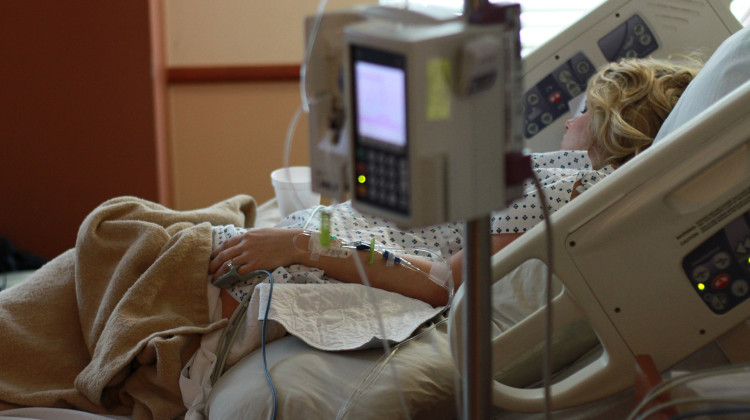Indiana lawmakers continue to debate bills that aim to tackle health care costs. Several bills are making their way through the legislature, even as health care leaders express concerns about possible ripple effects.
House Bill 1004, which aims to cap hospital prices, cleared committee after it was watered down from its original version. Senate Bill 7, which aims to ban physician non-compete agreements, failed to clear committee. And Senate Bill 8, which aims to lower drug costs by targeting pharmacy benefit managers’ profit margins, easily glided through a committee vote with few amendments.
Price caps and potential fines to hospitals
HB 1004 passed with a 6-5 vote last week after hours of debate. It has now been referred to the Appropriations Committee.
In its current form, the bill would require nonprofit, non-critical access hospitals to submit an annual report detailing the average price the hospital had charged patients for health care services and their total revenue. And starting January 2025, those hospitals can be fined if their prices exceed the national average, as benchmarked by 260 percent of what Medicare pays for the same services. Money from the fines would be deposited in the Healthy Indiana Plan account for Medicaid insurance coverage.
The Employers Forum of Indiana, a non-profit employer-led coalition focused on health care issues, supports the bill. In a statement, the organization said: “The concentrated market power of large health systems in Indiana has driven healthcare prices to inordinately high levels in Indiana.”
A recent analysis by the Employers Forum of Indiana suggests that people in Indiana could save up to $2 billion in health care costs if non-critical access, non-profit hospitals lowered their prices in the manner outlined in HB 1004. The analysis found that non-profit, non-critical access hospitals collected 76 percent of the commercial patient revenue in the state. A legislative cap on hospital prices would impact this big chunk of health care expenditures and potentially make a big dent, said Gloria Sachdev, the president and CEO of the Employers Forum of Indiana.
But hospital leaders take issue with the metric that lawmakers have agreed to use to cap prices. Brian Tabor, the president of the Indiana Hospital Association, calls it an “arbitrary” benchmark that would financially hurt Indiana hospitals.
“We believe this unjustly targets hospitals and moves away from a holistic way of controlling overall health care costs,” Tabor said in a statement.
The bill had been weakened after the removal of provisions that would have provided a tax break for independent physicians, established a health care costs oversight board and prevented hospitals from charging an extra fee, known as a facility fee, when certain services are provided off the hospital’s main campus. Another bill, which is still in committee and has not yet been voted on, specifically tackles the facility fee.
Lowering drug prices
SB 8 aims to lower drug prices by requiring pharmacy benefit managers to pass on drug rebates and discounts to consumers. The bill cleared a committee vote last week with only one opposing vote.
The current version of the bill would require pharmacy benefit managers to submit a report to the Indiana Department of Insurance bi-annually, detailing how much they make from working as the middlemen between pharmacies and health insurers. The reports would include aggregate data on the amount charged to health plans and the amount paid to pharmacies.
The measure would require health insurers to apply 100 percent of the rebates they receive to lower health plan premiums for individual plan members or to pass on 85 percent of the rebates to consumers at the point of sale. The bill also allows the department of insurance to impose penalties if insurers and PBMs do not comply.
The bill’s effective date was delayed to January 2025.
The bill will now move to the House floor for further deliberation and another vote.
Physician non-compete agreements
SB 7 would encourage physician autonomy by banning hospitals from using non-compete agreements in labor contracts with physicians. The measure failed to clear a committee vote last week after more than 2 hours of debate and testimony. House lawmakers voted 6-6 and the bill is currently stalled in the Employment, Labor and Pensions Committee.
The bill was amended from its original version to strip the provisions pertaining to doctor referrals and kickbacks.
In its current form, the bill would not apply to already existing physician contracts and would only apply to new contracts between physicians and hospitals starting July 2023.
Proponents of the bill said that banning non-competes will help retain physicians in the state by allowing them to change jobs without having to drive hours to another hospital or leave the state.
SB 7 sponsor Sen. Justin Busch (R-Fort Wayne) said that banning non-compete for physicians is not a partisan issue –– there are both Republican- and Democrat-led states already banning non-competes.
Rep. Ryan Hatfield (D-Evansville) said he’s concerned about the state interfering in private contracts. He referred to California, where non-compete agreements are unenforceable across all industries including health care, saying “California gets involved in a lot of private matters. We do things differently here in a lot of ways” in Indiana.
Others cited worries that a ban on non-competes in Indiana would hurt independent physician practices that could lose their staff to bigger health systems in the area.
Linda Wilgus, the executive director of Northwest Radiology Network in Central Indiana, said that independent physician groups “do not have the deep pockets” of bigger health systems and private equity groups.
“The elimination of non-competes for independent physician groups would significantly harm our ability to remain independent,” she said.
Wilgus and other independent physician groups called on lawmakers to exempt groups like them from SB 7.
Another vote on the bill is expected this week.
Contact Farah at fyousry@wfyi.org. Follow on Twitter: @Farah_Yousrym
 DONATE
DONATE








 View More Articles
View More Articles



 Support WFYI. We can't do it without you.
Support WFYI. We can't do it without you.